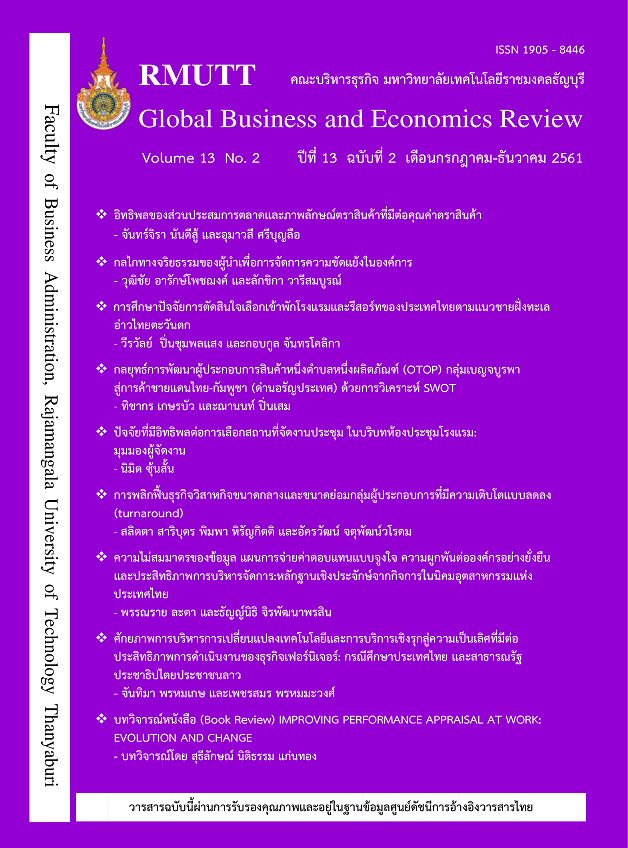ETHICS MECHANISM OF LEADERSHIP FOR CONFLICT MANAGEMENT IN AN ORGANIZATION
Keywords:
Ethics Mechanism, Ethics of Leadership, Organization conflicts, Conflict ManagementAbstract
The important management organization is to inculcate ethical behavior within the Organization. Which constitute a development of the idea. The subconscious feelings of the members of the organization to have good behavior, according to norms, social values and traditions. Therefore, the development of human resources the moral and ethics. It is directly on the success of the organization in terms of building confidence, dedication, good image and conflict management within the organization. To strengthen ethics in the Organization, is considered a strong cost management or organization leaders can develop guidelines or the application, as appropriate, to the Organization and management of conflict in various ways. In both the prevention and suppression of dimension fortress. The management of conflicts that may be a factor in the organization does not meet the objectives. To cultivating the ethical happening in organization. Necessary leader or leaders must push and a model of ethical principles upheld in practice. This article presents the importance of the ethics Mechanism of leadership or management that is used as an ethics mechanism for conflict management, to achieve the efficiency and sustainability of the organization.
References
กษิรา เทียนส่องใจ. (2550). การศึกษาวิเคราะห์อภัยทานเพื่อจัดการความขัดแย้งในสังคมไทยปัจจุบัน. (วิทยานิพนธ์ปริญญามหาบัณฑิต, มหาจุฬาลงกรณ์ราชวิทยาลัย).
จินตนา บุญบงการ. (2553). จริยธรรมทางธุรกิจ (พิมพ์ครั้งที่ 13). กรุงเทพฯ: สำนักพิมพ์แห่งจุฬาลงกรณ์มหาวิทยาลัย.
ชูชาติ พลสงคราม. (2560). การบริหารความขัดแย้งในองค์การของบุคลากรสังกัดองค์กรปกครองท้องถิ่นใน เขตพื้นที่อำเภอคูเมือง จังหวัดบุรีรัมย์. (วิทยานิพนธ์ปริญญามหาบัณฑิต, มหาวิทยาลัยราชภัฏบุรีรัมย์).
ณัฎฐนันท์ ทรัพย์อินทร์. (2556). ความสัมพันธ์ระหว่างจริยธรรมในองค์กรและความผูกพันต่อองค์กรของพนักงานในกระทรวงอุตสาหกรรมเขตกรุงเทพมหานคร. (วิทยานิพนธ์ปริญญามหาบัณฑิต, มหาวิทยาลัยเทคโนโลยีราชมงคลธัญบุรี).
ดวงเดือน พันธุมนาวิน. (2538). จริยธรรมในการทำงาน. กรุงเทพฯ: สำนักพิมพ์ไทยวัฒนาพานิช.
ดวงเดือน พันธุมนาวิน. (2544). ทฤษฎีต้นไม้จริยธรรม: การวิจัยและการพัฒนาบุคคล. กรุงเทพฯ: สํานักงานกิจการ โรงพิมพ์องค์การสงเคราะห์ทหารผ่านศึก.
ดวงเดือน พันธุมนาวิน. (2548). ทฤษฎีต้นไม้จริยธรรมสําหรับคนไทย: อดีต ปัจจุบัน และอนาคต. ในเอกสารประกอบการประชุมปฏิบัติการ (รุ่นที่ 1 ครั้งที่ 1) เรื่อง การใช้และการผลิตผลงานวิจัยทางจิตพฤตกรรมศาสตร์เพื่อประโยชน์แก่สังคมไทย. กรุงเทพฯ: สํานักงานคณะกรรมการวิจัยแห่งชาติ.
ดุจเดือน พันธุมนาวิน. (2550). รายงานการสังเคราะห์งานวิจัยเกี่ยวกับคุณลักษณะและกระบวนการปลูกฝังคุณธรรม จริยธรรมของประเทศไทยและต่างประเทศ. กรุงเทพฯ: ศูนย์ส่งเสริมและพัฒนาพลังแผ่นดินเชิงคุณธรรม สํานักงานบริหารและพัฒนาองค์ความรู้ (องค์กรมมหาชน).
ทยากร สุวรรณปักษ์. (2560, มกราคม - มิถุนายน). จริยธรรมทางธุรกิจและผลการดำเนินงานของวิสาหกิจขนาดกลางและขนาดย่อมในจังหวัดมุกดาหาร. วารสารมนุษยศาสตร์และสังคมศาสตร์ มหาวิทยาลัยอุบลราชธานี, 4(1), 46-66.
เนตรพัณณา ยาวิราช. (2555). จริยธรรมธุรกิจ (พิมพ์ครั้งที่ 2). กรุงเทพฯ: ทริปเพิล กรุ๊ป.
ปกรณ์ สิงห์สุริยา. (2559). ความเคารพยอมรับในปรัชญาของปอล ริกเกอร์. ใน สถาอนันต์ (บรรณาธิการ), สร้างแผนที่จริยศาสตร์. กรุงเทพฯ: วิภาษา.
ปริศนา รักษาเมือง. (2559). อิทธิพลของความฉลาดทางจริยธรรมของผู้บริหารสถานศึกษาที่ส่งผลต่อความผูกพันต่อองค์กรของครูผู้สอน สังกัดองค์กรปกครองส่วนท้องถิ่นระดับตำบล จังหวัดอุดรธานี.(วิทยานิพนธ์ปริญญามหาบัณฑิต, มหาวิทยาลัยราชภัฏอุดรธานี.
พรนพ พุกกะพันธ์. (2544). ภาวะผู้นำและการจูงใจ. กรุงเทพฯ: โรงพิมพ์จามจุรีโปรดักท์.
พิพัฒน์ นนทนาธรณ์. (2555). การจัดการจริยธรรมธุรกิจ. กรุงเทพฯ: ศูนย์ผู้นำธุรกิจเพื่อสังคม.
พุทธทาสภิกขุ. (2553). การธำรงรักษาและเผยแพร่จรยิธรรมแนะแนวจริยธรรม. กรุงเทพฯ: บริษัทศิริพัสดุ.
วันชัย วัฒนศัพท์. (2550). ความขัดแย้ง: หลักการและเครื่องมือแก้ปัญหา (พิมพ์ครั้งที่ 3). ขอนแก่น:ศิริภัณฑ์ออฟเซ็ท.
ศิลปพร ศรีจั่นเพชร. (2554, กรกฎาคม-กันยายน). คุณธรรม จริยธรรม กลไกเสริมสร้างการกำกับดูแลกิจการที่ดี. วารสารบริหารธุรกิจ, 34(131), 1-4.
สุขุมพงษ์ ชาญนุวงศ์ และคณะ. (2559, กันยายน – ธันวาคม). ความยุติธรรมในมิติด้านวัฒนธรรม จริยธรรม ทางศาสนา และธรรมาภิบาล. วารสารวิชาการ Veridian E-Journal, Silpakorn University ฉบับภาษาไทย สาขามนุษยศาสตร์ สังคมศาสตร์และศิลปะ, 9(3), 1370-1381.
สุมิตรา แดงศรี. (2557). ปัจจัยที่มีผลต่อการสร้างค่านิยมจริยธรรมองค์กร กรณีศึกษา กรมส่งเสริมคุณภาพสิ่งแวดล้อม. (วิทยานิพนธ์ปริญญามหาบัณฑิต, มหาวิทยาลัยเทคโนโลยีราชมงคลธัญบุรี).
Baldwin, S. (2006). Organizational justice. UK: Institute for Employment Studies.
Bandura, A. (1977). Social learning theory. In B. B. Wolman & L. R. Pomroy (Eds.), International of psychiatry, psychology, sychoanalysis, and neurology. (Vol.10). New York: Van Nostrand Reinhold.
Bercovitch, J. (2009). Mediation and conflict resolution. In Bercovitch, J., Kremenyuk, V., & Zartman, W. (Eds.), The Sage Handbook of Conflict Resolution. London: Sage.
Brown, W. B., & Mob, D. J. (1980). Organization theory and management: approach. New York: John Wiley and Sons.
Fishbein, M. & Ajzen, I. (1975). Belief, attitude, intention, and behaviour: an introduction to theory and research. Reading, MA: Addison-Wesley.
Freud, S. (1964). Group psychology and the analysis of the ego Sigmund Freud. New York: Bantam Books.
Gardner, H. (1997, September). Multiple intelligences as partner in school improvement. Educational Leadership, 20-22.
Hoffman, M. L. (1979). Development of moral thought, feeling and behavior. American Psychologist, 10, 958-966.
Kohlberg, L. (1976). Development of moral character and moral ideology review of child development research. New York: Russell Sage Foundation.
McClelland, D. C (1985). Human motivation. Cambridge: Cambridge University Press Management.
Piaget, J. (1932). The moral judgement of the child. New York: The Free Press.
Plato. (1984). The republic, in great books of the western world: the dialogues of plato. Vol.7, pp.295-401. Robert Maynard Hutchins, 27th ed. Chicago: Encyclopaedia Britannica.
Rokeach. (1973). Attitude and attitude change. New York: John Wiley & Sons.
Rotter, J. B. (1966). The Development and Application of Social Learning Theory. New York: Pracger.
Sills, D. L. (1968). International encyclopedia of the social sciences. New York: Macmillan.
Smith, M. (1971). Educational leadership: culture and diversity. Gateshead: Athenaeum Press.
Swanson, R. A. (1995). Human resource development: performance is the key. Human Resource Development Quarterly, 6(2), 207-213.
Trevino, L. K., & Brown, M. (2007). Ethical leadership: a developing construct. in positive organizational behaviour. Edited by D. L. Nelson; & C. L. Cooper. pp. 101-116. London: Sage Publications.
Vroom. (1964). V. H. Work and motivation. New York: Wiley.
Wotruba, T. R., & Wright, P. L. (1975). How to develop a teacher rating instrument. Journal of Higher Education, 46(6), 653-660.
Downloads
Published
How to Cite
Issue
Section
License
The articles published in this journal are the intellectual property of their respective authors.
The views and opinions expressed in each article are solely those of the individual authors and do not reflect the positions of Rajamangala University of Technology Thanyaburi or any of its faculty members. All components and content of each article are the sole responsibility of the respective authors. In the event of any errors, the authors shall bear full responsibility for their own work.








